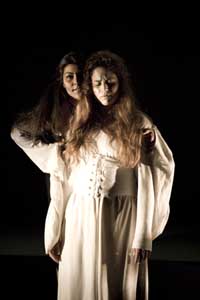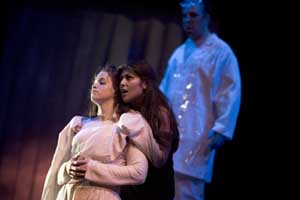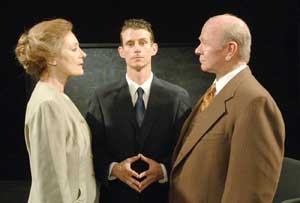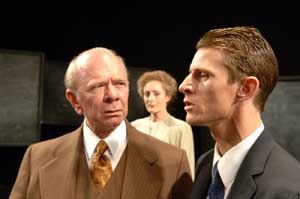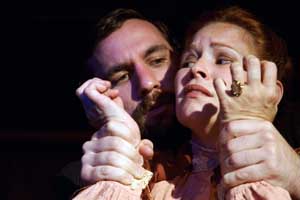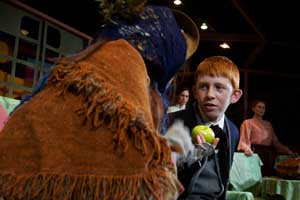-
- Gay Republican tests party faithful in Minnesota primary fight
- Despite disagreements, Calif. conservatives embrace Schwarzenegger
- Gay community celebrates at Southern Decadence
- U.S. states address gay domestic violence
- In same-sex marriage debate, minority clergy enlisted in battle
- Karr: ‘I’m not gay, damn it’
- National News Briefs
- World News Briefs
Arts & Entertainment
Of suicide, science and the Norwegian George and Martha
Published Thursday, 07-Sep-2006 in issue 976
4.48 Psychosis
At 4:48 a.m., when darkness is deep and the body’s chemical imbalance is at its peak, a moment of sanity and lucidity comes, or so it is said. It is at this hour that British playwright Sarah Kane’s character decides to kill herself.
She does this without self-pity, without a plea for help or for understanding. She knows psychiatry and medication will not change the crushing burden of her existence, that death is her only escape.
Stone Soup Theatre presents Kane’s 4.48 Psychosis through Sept. 17 at the 10th Avenue Theatre downtown, directed by Rebecca Johannsen.
The 4.48 Psychosis script notes that the first production in 2000 featured three actors, but no characters are named or identified; it could as easily be done as a monologue. The redoubtable Isabelle Huppert did just that in a Paris production in 2002.
Here, two women in impressionistic representations of straitjackets (presumably sides of one splintered personality) rage, agonize, despair and ultimately accept their fate. A third male character, apparently a psychiatrist, tries to work with this disordered mind through talk therapy and pills, at one point reciting a harrowing litany of the drugs tried and their effects.
But the woman, with knowledge the pill dispenser does not have, is beyond help.
“Inscrutable doctors … offer chemical cures for congenital anguish,” she says. “This is not a world in which I wish to live.”
Kane, who wrote five plays before her 1999 suicide at the age of 28, has left in this play and in Crave a litany for the lost, a chilling view inside the mind of the mentally ill.
4.48 Psychosis is unutterably sad, but because Kane was a remarkable writer, also strangely beautiful. It’s impossible not to respond to her assessment of psychiatry: “A room of expressionless faces staring blankly at my pain, so devoid of meaning there must be evil intent.” And of treatment: “Sanity is found at the center of convulsion, where madness is scorched from the bisected soul.”
Johannsen has assembled a fine cast. Olivia Espinosa plays the side of the woman who longs for connection; Therese Schneck the side that has made the fatal decision and now wants to get on with it. Steve Hohman plays the ineffectual psychiatrist just the way the woman would see him. Kudos also to Crystal Watts for her effective lighting design.
4.48 Psychosis is not for all tastes, but this one-hour show should be required viewing for mental health professionals and those who wish to understand the mentally ill. It is also recommended for the adventurous theatergoer.
4.48 Psychosis plays through Sept. 17 at 10th Avenue Theatre (930 10th Ave.). Shows Fridays and Saturdays at 8:00 p.m. and Sunday at 2:00 p.m. For tickets, call (760) 434-9363 or visit www.stonesouptheatre.net.
Copenhagen
The Danish “pope” and the German wunderkind of theoretical physics met in 1920 at a conference in which “pope” Niels Bohr spoke. He basked in the unanimous accolades of his professional colleagues until the 20-year-old Werner Heisenberg suggested that Bohr’s mathematics were wrong. Bohr immediately took Heisenberg on a long walk, where it became apparent the young pup was right.
Bohr invited Heisenberg to Copenhagen, where for years they worked happily together in several areas, including quantum mechanics, complementarity and uncertainty.
Politics split them in the ’30s, when Heisenberg was put in charge of Germany’s nuclear development project.
In 1941, Heisenberg gave a talk in Copenhagen. While there, he visited Bohr and his wife, Margrethe, for reasons still speculated about. There is no transcript of the meeting and the participants’ accounts differed.
Playwright Michael Frayn speculates on that meeting in his Tony-winning Copenhagen, playing through Sept. 24 at Cygnet Theatre, directed by George Yé. The show stars Jim Chovick as the Jewish Bohr, Rosina Reynolds as Margrethe and Joshua Everett Johnson as Heisenberg.
Copenhagen is a fascinating portrait of psychological and emotional approach and retreat, as well as a riveting exploration of the politics of science and the ethics of research in a field where the intended goal is an instrument of mass destruction. Frayn reports the meeting from beyond the grave and from all points of view, each character both participating in and commenting on the conversation.
Because these are scientists, some of the conversation is scientifically dense, but Frayn uses the non-scientist Margrethe’s presence to bring Bohr and Heisenberg back to “speaking English.” At any rate, whether you understand the science is less important than the relationship between these two scientific giants.
Johnson’s Heisenberg is terrific – young, bright, eager, questioning – the kind of student teachers live for. And when he returns as an important presence in German science, the irrepressible curiosity remains; the level of disclosure tempered by political necessity.
Reynolds, always a pleasure to watch, carries off this most difficult part with aplomb and the professionalism always evident in her work. She has both the best and the fewest lines, and long stretches where she just waits. It’s marvelous.
Chovick is excellent as Bohr, who both wants and doesn’t want to see this man with whom he walked and talked and worked for all those years – this man he regarded as a son, who went off to work for the despicable Nazi cause. Note to Jim: Please correct the President Bush-like pronunciation of the word “nuclear.”
Copenhagen plays through Sept. 24 at Cygnet Theatre. Shows Thursday through Saturday at 8:00 p.m. and Sunday at 2:00 and 7:00 p.m. For tickets, call (619) 337-1525 ext. 3 or visit www.cygnettheatre.com.
Little Eyolf
In the contest for most depressing play, you’ll find lots of Chekhov, some O’Neill, all of Sarah Kane and at least one Ibsen.
The brand new Tonic Productions presents Ibsen’s Little Eyolf through Sept. 10 at 6th @ Penn Theatre, directed by Dustin Condren. The play has been newly translated by Eric Samuelsen.
Little Eyolf, a family drama, is a strange mélange of invented folklore and the sort of realistic dialogue that tears at the psychic flesh and reduces the characters to their naked desires. More akin to Who’s Afraid of Virginia Woolf than to Ibsen’s better-known works, Little Eyolf brings us three main characters. The unhappily married Alfred (John DeCarlo) and Rita (Crystal Verdon) live on a fjord with their young son, Eyolf (Austin Potts), crippled in infancy as the result of an accidental fall. The third wheel is Alfred’s half-sister, Asta (Nicole Solas), whose almost unnatural closeness to Alfred has heightened Rita’s natural jealousy. She regards Asta as a too-frequent and unwelcome guest in their home. A fourth, peripheral character is the engineer Borghejm, whose interest in Asta is repulsed at every turn.
The accident has distanced Alfred and Rita in ways apparently not spoken of until now: The domineering Rita is a sexually desperate housewife, shut out from Alfred’s emotional as well as his sexual life. Alfred has taken refuge in his study, writing a book tellingly entitled Human Responsibility, the irony of which will soon become apparent.
At the beginning of the play, Alfred returns from a solo trip to the Norwegian mountains a changed man. Citing his frequently mentioned Law of Change (and opining that “I couldn’t find any peace in my work anymore”), he announces that he has decided to abandon his philosophical pursuits and devote himself to Eyolf.
But Eyolf’s unexpected drowning changes the trajectory of their lives yet again, and it slowly becomes evident that Alfred actually has darker plans: to leave Rita and live with Asta (“I’m so glad someone I love is here,” he tells her at one point). He does not ask Asta’s opinion or assent. The second and third acts build, both in the savagery of the blame game between Rita and Alfred (eventually including Asta) and in the unsettling implications of Alfred’s plan.
It is a searing and difficult play to watch, lightened in this production by Veronica Murphy’s puzzling but delightful Rat-Wife (an invented Nordic Pied Piper), who knocks at the door to ask whether there is need to rid the property of rats. Murphy’s ragged look and captivating performance come close to stealing the show, as she describes how she and her friend Mopsemand get rid of rats. (Rat-Wife’s creature is an ugly canine hand puppet, a sort of cloth pug.)
Murphy also does unscripted but wonderful pre- and post-show speeches.
Little Eyolf, a meditation on guilt, remorse, blame, desire and change, is a difficult piece to pull off, with its odd construction and an ending as inexplicable as the Rat-Wife’s presence. Condren benefits from fine acting all around and two terrific performances (by Murphy and Solas). On the down side, the production is not helped by an amateurish set.
So, a hearty welcome to Tonic Productions. I look forward to your next show.
And for those who want to see a seldom-performed play by a great playwright, Little Eyolf awaits.
Tonic Productions’ Little Eyolf plays through Sept. 10 at 6th @ Penn Theatre. Shows Thursday through Saturday at 8:00 p.m. and Sunday at 2:00 p.m. For tickets, call (619) 246-4854 or visit www.tonicproductions.org.
|
|
Copyright © 2003-2025 Uptown Publications

